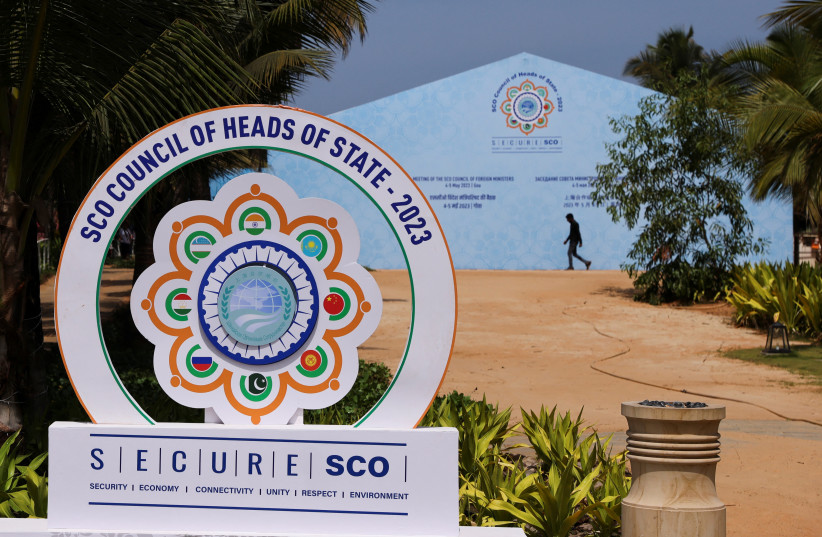The UAE became a dialogue partner of the Shanghai Cooperation Organization (SCO), according to Gulf media.
A memorandum of understanding was signed between the countries at a meeting in Goa in India. The UAE’s decision is part of a larger trend in the region of countries joining an organization that has heavy hitters – like Russia, China and India.
The SCO also includes Pakistan, Kazakhstan, Kyrgyzstan, Tajikistan and Uzbekistan. This will be seen as another example of how China and Russia are making inroads in the Middle East, and countries may be hedging between the US-led hegemonic international order and a multipolar world – championed by Russia, Pakistan, Iran, India, Turkey and others, which prefer a weakened US and West to foreign policies focused on Asia.
China, Russia make inroads in the Middle East, countries hedge bets on world order
Iran as well signed a memorandum to join the SCO, and it is not the only country in the Middle East looking to work with the organization, including Egypt, Saudi Arabia, Turkey, Qatar, Kuwait, Bahrain – and now the UAE.
While Iran joining the SCO counts as a country under sanctions joining a China-Russia grouping that benefits Tehran, the decision by other states in the region can be seen more as a reflection on their attitude towards US hegemony. Saudi Arabia, the UAE, Bahrain and Egypt are all close partners of the US; Bahrain, the UAE and Egypt all have peace with Israel; Qatar is a major non-NATO ally of the US, while Turkey is a member of NATO.

The Middle East-SCO partnership is a fairly new trend. Turkey inched closer in 2012, but Qatar, Egypt and Saudi Arabia only became dialogue partners within the last year, as well as Bahrain, Kuwait and the UAE. The rapid trend is growing in the region to recognize the SCO as important.
“Both organizations, led by China and Russia, are working to help the global transition from a unipolar world led by the USA to a multipolar world. That’s an attempt to reduce American preeminent global world, establish parallel organizations to World Bank and IMF, and de-dollarize the global market.”
Robert Rabil
Robert Rabil, a professor of political science at Florida Atlantic University, noted the importance of this trend.
“Both organizations, led by China and Russia, are working to help the global transition from a unipolar world led by the USA to a multipolar world. That’s an attempt to reduce America’s preeminent global world, establish parallel organizations to the World Bank and IMF, and de-dollarize the global market,” he said, noting further that “what’s happening is a recent indication to the reshaping of the new international order. Yet, our foreign policy establishment, egged on by the mainstream media, is acting as nothing is happening and focusing on defeating Russia as a panacea to the spread of illiberal democracy.”
An Arab News article published last year likely reflects well the approach in the region to the SCO.
“Established in 2001 as a successor to the Shanghai Five, the SCO is the largest regional grouping in Eurasia, covering around 40% of the world’s population and 30% of global economic output. Owing to its impressive profile of security and economic cooperation, the SCO has gained enormous traction across Asia. No surprise that a number of countries from the Middle East and Southeast Asia are lining up to join as dialogue partners, observers and members.”
The article notes that the US has observed the bloc to be hostile, but the author claims that the grouping is merely part of the new regionalism of the developing world, comparing it to the Gulf Cooperation Council (GCC) and Association of Southeast Asian Nations (ASEAN).
“All are intergovernmental organizations with similar structures, defying the supranational mode of integration in the EU.... The SCO also shares significant similarities with the GCC and ASEAN in terms of its origin and evolution. It was created to combat the three evils of terrorism, extremism and separatism. The GCC and ASEAN also came into being to address the security threat from Iran and communism, respectively. While regional security remains a common concern for both organizations, their real success lies in economic integration: GCC’s common market versus ASEAN’s economic community.”
The rise of the SCO and other groupings like BRICS and CICA represents a shifting international order. In June 2019, a report at The Jerusalem Post noted that summits of CICA and the SCO in Central Asia that year were an illustration of how US influence was being challenged. At the time, Iran was seeking to play a larger role in these groupings.
Today, with Iran reconciling with the Saudis and many countries in the Middle East also repairing relations, the SCO has a larger potential role to play. For states that are left out of the grouping, like Israel, this will be a symbol of countries that hedge their bets and those that are firmly planted in the West.
